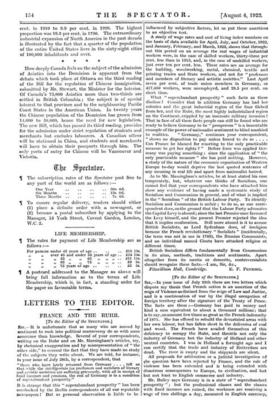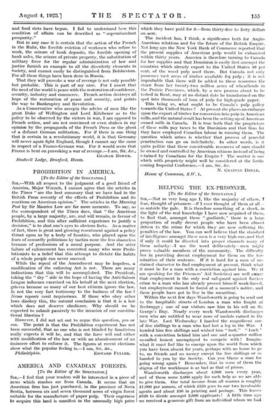[To the Editor of the SPECTATOR.] Snt,—In your issue of
July 28th there are two letters which dispute my thesis that French action is an assertion of the reign of Violence as distinct from the reign of Law and Justice, and is a continuation of war by the illegal occupation of foreign territory after the signature of the Treaty of Peace. The facts are these :—Germany has paid in money and kind a sum equivalent to about a thousand millions ; that is to say,an amount five times as great as the French indemnity of 1871. She has offered to rebuild the devastated areas with her own labour, but has fallen short in the deliveries of coal and wood. The French have availed themselves of this deficiency to occupy the Ruhr, and throttle not only the industry of Germany but the industry of Holland and other neutral countries. I was in Holland a fortnight ago and I can certify that the trade and industry of Rotterdam are dead. The river is empty and the shipyards are silent.
All proposals for arbitration or a judicial investigation of the question have been rejected by France, and the rule of violence has been extended and is being extended with disastrous consequences to Europe, to civilization, and last but not least to English commerce and industry.
Mr. Bulley says Germany is in a state of " superabundant prosperity " ; but the professional classes and the classes with fixed incomes are ruined, the workmen are receiving a wage of two shillings a day, measured in English currency,
and food riots have begun. I fail to understand how this condition of affairs can be described as " superabundant prosperity."
But in any case it is certain that the action of the French in the Ruhr, the forcible eviction of workmen who refuse to work, the seizure of bank deposits, the forcible opening of bank safes, the seizure of private property, the substitution of military force for the regular administration of law and justice furnish an example to all the disorderly elements in society, and cannot easily be distinguished from Bolshevism. For all these things have been done in Russia.
That they will provoke a war of revenge is not only possible but probable. This is part of my case. For I assert that the need of the world is peace with the restoration of confidence, security, industry and commerce. French action destroys all hope of the restoration of peace and security, and points the way to Bankruptcy and Revolution.
As a Conservative who accepts the advice of men like the great Duke of Wellington and Lord Kitchener as to the policy to be observed by the victors in war, I am opposed to French action, and am not convinced or even shaken in my opinion by the propaganda of the French Press or the ghost of a defunct German militarism. For if there is one thing that is certain in a revolutionary world, it is that Germany will never again fight England, though I cannot say the same in respect of a Franco-German war. For it would seem that France is bent on provoking a war of revenge.—I am, Sir, &c., Studrcell Lodge, Droxford, Hants.
GRAHAM BOWER.



































 Previous page
Previous page